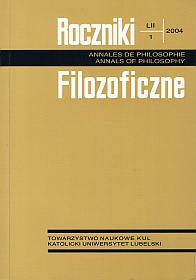Place, Vacuum and Space in Pre-Newtonian Philosophy of Nature
Abstract
Our aim in this article is to trace the evolution of the concepts of physical space in Western thought from the Greeks to the Newtonian philosophy of nature. Especially the article presents studies of ancient Greek theories of physical space and place, in particular those of the classical and Hellenistic period. These theories are explained primarily with reference to the general philosophical or methodological framework within which they took shape. Special attention is paid to the interrelations between various concepts of space and with Greek spatial terminology.
The arguments of this paper can be summarized as follows: first, the concept of space itself has taken the central position in philosophy of nature; second, the debate about the nature of space has developed several different theories; third, the concept of space has several issues to overcome.
References
Algra K. A.: Concepts of Space in Greek Thought, Leiden–New York–Köln: E. J. Brill 1995.
Algra K. A.: Concepts of Space in Classical and Hellenistic Greek Philosophy, Utrecht 1988.
Crombie A. C.: Nauka średniowieczna i początki nauki nowożytnej [tyt. oryg. Medieval and Early Modern Science], tłum. S. Łypacewicz, t. 1-2, Warszawa: PAX 1960.
Čapek M.: The Concepts of Space and Time. Thier Structure and Thier Development. Dordrecht–Boston: D. Reidel Publishing Comapny 1976.
Grant E.: Much Ado about Nothing: Theories of Space and Vacuum from the Middle Ages to the Scientific Revolution, Cambridge: Cambridge University Press 1981.
Grant E.: The Medieval Doctrine of Place: Some Fundamental Problems and Solution, [w:] A. Maierù, A. Paravicini Bagliani (eds.), Studi sul XIV secolo in memoria di Anneliese Maier, Roma 1981, s. 57-72.
Grant E.: Place and Space in Medieval Physical Thought, [w:] P. K. Machamer, R. G. Turnbull (eds.), Motion and Time, Space and Matter, Ohio 1976, s. 137-167.
Jammer M.: Concepts of Space. The History of Theories of Space in Physics, Cambridge, Mass.: Harvard University Press (1957) 19692.
Kapila Vatsyayan: Concepts of Space, Ancient and Modern, New Delhi: Indira Gandhi National Centre for the Arts: Abhinav Publications 1991 (Papers presented at a seminar held in New Delhi, November 1986).
Krokiewicz A.: Czas i przestrzeń w filozofii Epikura, „Przegląd Filozoficzny”, 27 (1924), s. 168-209.
Long J. R.: Roger Bacon on the Nature and Place of Angels, „Vivarium”, 35 (1997), nr 2, s. 266-282.
Machamer P. K., Turnbull R. G. (eds.): Motion and Time, Space and Matter: Interrelations in the History of Philosophy and Science, Columbus: Ohio State University Press 1976.
Markowski M.: Filozofia przyrody w pierwszej połowie XV wieku, Wrocław–Warszawa–Kraków–Gdańsk: Ossolineum 1976.
Markowski M.: Filozofia przyrody w drugiej połowie XV wieku, Wrocław–Warszawa–Kraków–Gdańsk–Łódź: Ossolineum 1983.
Mendell H.: Topoi on Topos: The Development of Aristotle’s Concept of Place, „Phronesis”, 32 (1987), s. 206-231.
Schrenk L. P.: Proclus Corporeal Space, „Archiv für Geschichte der Philosophie”, 76 (1994), s. 151-167.
Trifogli C.: Roger Bacon and Aristotle’s Doctrine of Place, „Vivarium”, 35 (1997), nr 2, s. 155-176.
Samburski S.: The Concept of Place in Late Neoplatonism, Jerusalem 1982.
Copyright (c) 2004 Roczniki Filozoficzne

This work is licensed under a Creative Commons Attribution-NonCommercial-NoDerivatives 4.0 International License.





